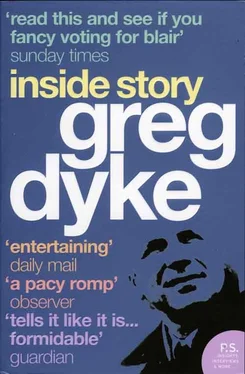It was three days before I began to realize that perhaps all was not as it had seemed to be. The idea came to me when I was talking to someone from within the BBC who told me that she believed some of the Governors had been out to get me regardless of Hutton. It got me thinking: did some of the Governors have another agenda?
By then I knew that three of the eleven Governors had supported me in the crunch vote: the ballet dancer Deborah Bull, the Oxford academic Ruth Deech and voluntary sector consultant Angela Sarkis were all against my leaving. They were the three Governors who had most recently joined the Board. The ‘posh ladies’ had both been against me and Sarah Hogg, in particular, had led the charge. She had told the Board that she had never liked me.
I was surprised when I discovered that I had not received any support from the Governors representing Scotland, Wales, Northern Ireland, and the English regions. If I had achieved one thing in my time at the BBC it was to increase investment and improve morale outside of London, and yet when the crunch came the Governors with particular responsibility for the Nations and Regions had all voted against me.
Not that they were ever the strongest of Governors. Three of them – Ranjit Sondhi, Fabian Monds, and Merfyn Jones – had said very little over the years. It always seemed to me that they were intimidated by the posh ladies. In the case of Ranjit, I understand he was in real trouble when he got home. His wife, Anita Bhalla, who works for the BBC as Head of Political and Community Affairs for the English Regions, was a big Dyke supporter and, reportedly, tore him to shreds for going along with the decision. Ranjit was a really likeable, incredibly hard-working Governor, but he was never likely to rock the boat about anything.
Only Robert Smith, an accountant and business leader from Scotland, had played a significant role at Governors’ meetings in my time, and it was always difficult to judge where he was coming from. At that time we all knew he was after a big new job as chairman of a major public company, and like so many accountants he loved to look tough if the opportunity presented itself.
I began to think about the conversation Gavyn, Pauline Neville-Jones, and I had had the night before Hutton was published. Surely if Pauline had said that she thought it was impossible for Gavyn and me to leave at the same time, shouldn’t she have been arguing on my behalf, given that Gavyn had already gone? And yet she hadn’t stood up for me and had in fact voted the other way. I began to think some more.
Pauline Neville-Jones had always been a big supporter of Mark Byford. As the Governor with special responsibility for the World Service she had worked closely with him and clearly rated him highly. I suspect she also liked him because, like most of the BBC lifers, he was better at the politics of dealing with the Governors, better at playing the game of being respectful. It was a game that I refused to play. I saw no reason why I should treat the Governors any differently from the way I treated everyone else. I certainly wasn’t going to regard the earth they walked on as if it was somehow holy ground. This wasn’t a wilful decision. It was just the way I am.
After I had left the BBC one senior executive said to me that if I had been a bit more servile in my attitude to the Governors I would still be there today. I have no doubt that’s true. Certainly both chairmen in my time at the BBC, Christopher Bland and Gavyn Davies, suggested on occasions that I ought to be more respectful and make fewer jokes at Governors’ meetings, but in truth I was never going to do that. I have never been one to respect position for its own sake and I was hardly likely to start in my fifties, particularly when dealing with a group of people most of whom knew absolutely nothing about the media, and who would have struggled to get a senior job at the BBC. In my time there were some excellent Governors, people like Richard Eyre and Barbara Young who had been on the Board when I joined, but I was not a fan of the system and made that obvious at times.
Whether this attitude to life is a weakness or a strength (and I suspect it is a bit of both) is largely irrelevant. That’s the way my DNA is. I’m not particularly good at watching my back, and never have been. If you employ me you have to take me for what I am. In the commercial world that’s not a problem because you are largely judged on the numbers. In the public sector, where accountability has become an obsession, you are judged on the strangest things, including how well you get on with the great and the good.
So why hadn’t Pauline Neville-Jones supported me as I thought she would? Again I thought back a few months. One day in early December 2003, at our regular weekly meeting, Gavyn Davies told me that Pauline and Sarah Hogg had been to see him and were demanding that he call a meeting of the Governors without me being present so that they could appoint Mark Byford as my deputy and put him in charge of all the BBC’s news output. I would then be told it was a fait accompli.
I laughed and told him that if they did that, then I would resign immediately. Gavyn told me that they were serious and were demanding he call the meeting. He asked me what he should do about it. I started by telling him that it was his problem but later said I’d think about it.
I’m certain Mark Byford didn’t know anything about this move; in his time working for me Mark was always loyal and supportive. In many ways the proposal for Mark to become my deputy was a good idea. I had never had an official number two but Mark acted as my deputy, if he was around, when I was away and in fact I had suggested the move to Gavyn myself earlier that year. Mark had real strengths, many of which complemented mine. I tended to be broad brush, he was into detail. I was into big decisions and taking risks, whilst Mark, like many of the senior people who had worked their whole life at the BBC, tended to be cautious and process driven. We would have been a good fit. Gavyn was against it at that stage because it would have indicated that Mark was the Board’s chosen successor to me when the time came for me to leave in three years’ time when I reached the age of sixty.
My objection to the proposal from the posh ladies was, firstly, the way they were going about it by going behind my back; secondly, that it was nothing to do with them, that I was the DG and would suggest who my deputy should be, not them; and, thirdly, that they wanted to put Mark in charge of all the BBC’s news output, thus effectively demoting the Director of News, Richard Sambrook. I was having none of that. However, with the Hutton report pending, even someone as naturally combative as me recognized that this was not a time for a big bust-up with the Governors and I had reached the conclusion we needed a change to the organization.
As Hutton had progressed, I had come to the view that our systems of compliance prior to and post broadcast needed to be brought together under one person, so I suggested to Gavyn that, as a way of appeasing the posh ladies, we should appoint Mark as my deputy and allow him to remain in charge of Global News but also take over all our compliance systems.
Gavyn took this proposal to the Governors and they agreed. The posh ladies seemed satisfied. On 1 January 2004, Mark Byford officially became my deputy. A month later I was gone and he was acting Director-General.
In the week after leaving I also discovered more about what had happened at that private Governors’ meeting on the previous Wednesday. When I had left the meeting with Gavyn I had asked the Secretary, Simon Milner, to tell the Governors that I wanted their support if I was to stay. I later discovered he told them that I had resigned, a subtle but crucial difference. Of course Pauline Neville-Jones knew that wasn’t what we had discussed the night before, so why didn’t she question it? I also discovered that, later in the meeting, when they were discussing whether or not they should change their position on my going, Simon had intervened to say that it was a bad idea because they’d never be able to control me if that happened.
Читать дальше












